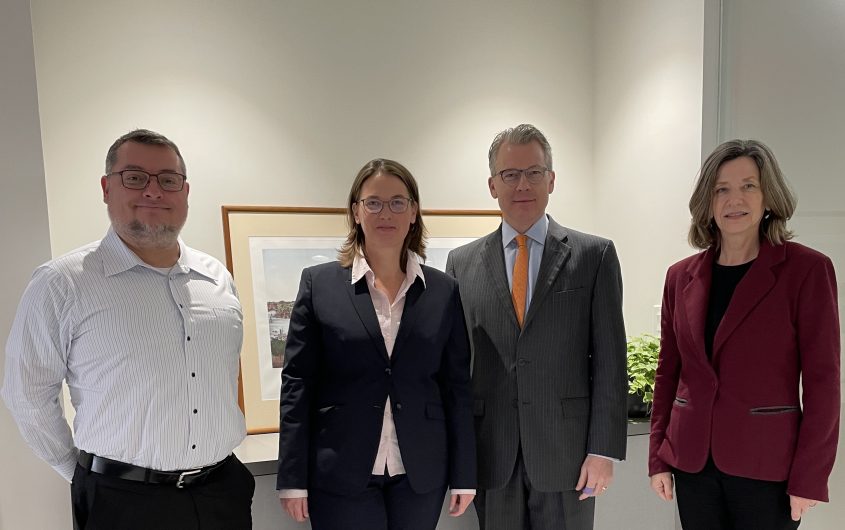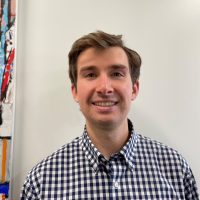
Local Governance of Religious Diversity

John Michaud
AGI/Halle Foundation Intern
John L. Michaud is a research intern at AGI for the spring of 2022. He provides writing and research support to AGI's programs, monitors the media, documents meetings and events, and assists with database management.
Mr. Michaud is pursuing an MA in International Affairs at American University, with a focus on U.S. foreign policy and transatlantic relations. He has completed coursework on topics including U.S. security strategy, foreign policy institutions, and nationalism. In the summer of 2023, he will spend a semester at Freie Universität Berlin, where he hopes to solidify his German language skills and gain a better understanding of German and European perspectives on security policy.
Mr. Michaud graduated from the University of Virginia with a BA in Foreign Affairs and minor in German. As an undergraduate, he spent a semester studying the European Union in Freiburg, Germany. Prior to graduate school, he worked at National Journal, where he led a research team dedicated to profiling top policymakers in Washington and beyond. He grew up just outside of the Beltway in Fairfax County, Virginia.
Through the Lenses of Hamburg and Washington, DC
Religious diversity brings issues of church-state relations as well interfaith relations into focus. While national narratives have been dominant in examinations of religion policy, understanding the local level is key. This is especially true in Germany, where the federal government for decades left integration policy, and thus religious policy, to local governments. Dr. Anna Körs’s research on the local governance of religious diversity in Washington, DC, builds off her previous research in Germany, mostly conducted in Hamburg. Her studies in both countries focused on three primary areas: interfaith governance, spatial governance, and state-interfaith governance. Dr. Körs presented the results of her DAAD/AGI Fellowship in a recent seminar.
Hamburg / Germany
Like Germany overall, Hamburg’s population is religiously diverse, with a large but shrinking Christian plurality, a significant unaffiliated segment, a sizable Muslim minority, and several smaller groups. Data show that interreligious interaction is common, but specific minority religious communities (especially Muslims) are more likely than Christian ones to engage in interreligious contacts and networks. The city views itself as a capital of interfaith dialogue in Germany, and there is an interfaith infrastructure with different components, including the Interreligiöses Forum Hamburg. Countrywide, interfaith forums are heavily concentrated in western Germany. Over time, interfaith dialogue in Germany has become more political, with backing from local, state, and federal authorities.
On the spatial level, churches in Germany have been converted for use by other groups (such as a Hamburg church that became a mosque) or turned into interfaith or secular spaces, sometimes with state support. In terms of state governance, Hamburg has signed “state contracts” with religious minority communities guaranteeing their rights in certain areas, which then-Mayor Olaf Scholz referred to as “agreement(s) to solve problems together.” These contracts are viewed as a step towards equal treatment of minorities, but also maintain a “two-class-system” that privileges Christian churches.
Washington, DC / United States
Washington, DC, is also a religiously diverse community, with a Christian majority, a sizable unaffiliated segment, and several minority communities represented. Survey interviews revealed that racial and ethnic diversity play a significant role in interfaith relations in Washington. Additionally, DC’s status as a capital city, with national and local institutions, impacts interfaith governance. The White House and the city government both have offices that interact with local faith communities. Spatially, Washington has faith buildings of national prominence, such as the National Cathedral, and hundreds of smaller ones throughout the city.
The Interfaith Council of Metropolitan Washington functions as a central network for faith communities. Compared to Germany, interfaith dialogue in the United States is more oriented towards addressing social issues than developing understanding between groups. The Washington Interfaith Network, for example, explicitly seeks to influence city politics and tackle issues such as affordable housing and climate change. This comparison suggests that religious communities in the United States use interfaith dialogue to influence political priorities, while in Germany politicians use interfaith dialogue to cooperate with different religious communities.
National monuments and government buildings predominate Washington’s landscape, while religious architecture is comparatively less prominent. Faith buildings in the District can have a national impact, as demonstrated by the National Cathedral’s decision to remove glass windows that depicted Confederate generals and replace them with new ones honoring African Americans. Both Washington and Hamburg face the question of how to handle church closures. Culture House DC is one example of a former church converted into a community center, with its outward architecture preserved. People interviewed for the project also expressed that the design of faith spaces impacts both internal diversity and the outside environment. For example, the open design of the Metropolitan Community Church of Washington, built for an LGBTQ faith community, is believed to have impacted the surrounding neighborhood’s architecture.
Several mayoral offices interact with faith communities in different areas, including engagement in city programs, security, and health. Interviewees emphasized the complementary nature of the relationship between faith and government institutions in Washington.
Discussion
The trend of secularization in the United States was addressed. Faith leaders interviewed for the study in Washington were highly aware of the trend and had actively sought to engage unaffiliated persons. Participants also discussed why interfaith dialogue might play a different role in the United States and Germany. One proposed answer relates to the relative weakness of state-run social programs in the United States compared to Germany. As a result, faith communities in the United States might be more compelled to advocate on issues like affordable housing. It was pointed out that faith-based organizing on political issues is practically nonexistent in Germany. Lastly, participants explored the degree to which Washington and Hamburg were “innovators” in the policy field of religious governance.








